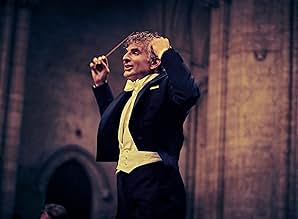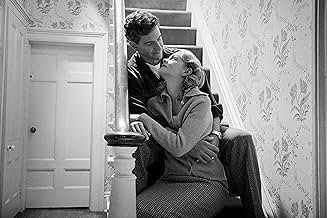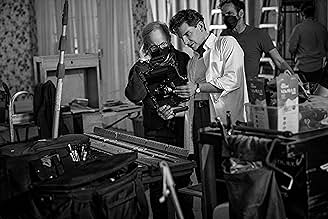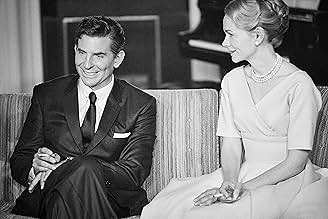This love story chronicles the lifelong relationship of conductor-composer Leonard Bernstein and actress Felicia Montealegre Cohn Bernstein.This love story chronicles the lifelong relationship of conductor-composer Leonard Bernstein and actress Felicia Montealegre Cohn Bernstein.This love story chronicles the lifelong relationship of conductor-composer Leonard Bernstein and actress Felicia Montealegre Cohn Bernstein.
- Nominated for 7 Oscars
- 27 wins & 180 nominations total
- Director
- Writers
- All cast & crew
- Production, box office & more at IMDbPro
Featured reviews
It's an old (and unanswerable) question: to what extent is it possible - or desirable - to separate the art from the artist? Is it possible to appreciate the art simply as art, and not to delve into the (sometimes tawdry) details of the artist? Or are the art and the artist so inextricably entwined that you cannot understand the one without knowing the other?
I very much lean towards separation. I fell in love with Bernstein's music the first time I saw West Side Story mumble years ago at an impressionable age; which is why I was disappointed that there was so little West Side Story in this film. Surely a biopic of a composer should feature that composer's music pretty heavily?
Of course, we all know that beneath every great artist is a human being - usually with a collection of human flaws. But does this matter? Well, it matters here. What we mostly get is a film about Leonard the man, and his complicated marriage to Felicia Montealegre. Much of this was new to me. I knew that Bernstein was bisexual, but didn't care. I find that I also don't care about most of the other details of his life which were revealed to me - although if the film was truly about the man, not his music, his record as a human rights activist should probably have been at least touched on. But never mind that: I came for the music, and didn't get enough.
Not that this film is without merit. Bradley Cooper's performance is first class - there's one sequence in which he truly shows us the passion of a great conductor - and Carey Mulligan is as riveting as ever. Cinematography and sound are both excellent.
Overall, this is a good film, but ultimately a disappointing one.
I very much lean towards separation. I fell in love with Bernstein's music the first time I saw West Side Story mumble years ago at an impressionable age; which is why I was disappointed that there was so little West Side Story in this film. Surely a biopic of a composer should feature that composer's music pretty heavily?
Of course, we all know that beneath every great artist is a human being - usually with a collection of human flaws. But does this matter? Well, it matters here. What we mostly get is a film about Leonard the man, and his complicated marriage to Felicia Montealegre. Much of this was new to me. I knew that Bernstein was bisexual, but didn't care. I find that I also don't care about most of the other details of his life which were revealed to me - although if the film was truly about the man, not his music, his record as a human rights activist should probably have been at least touched on. But never mind that: I came for the music, and didn't get enough.
Not that this film is without merit. Bradley Cooper's performance is first class - there's one sequence in which he truly shows us the passion of a great conductor - and Carey Mulligan is as riveting as ever. Cinematography and sound are both excellent.
Overall, this is a good film, but ultimately a disappointing one.
Maestro (2023) seems a very flimsy "biography" of Leonard Bernstein. We learn just about nothing of his life. Music. Wife. Boys on the side. Other than that?
The film stars Bradley Cooper and a fake nose. He (Cooper, not the nose) also co-wrote, directed, and produced and is being hailed for his work and artistic ambition. Coincidentally, I'm reading Barbra Streisand's new 970-page memoir and in her section on Yentl, she recalls the reviews that lambasted her colossal ego to star in a film she also co-wrote, directed, and produced.
Anyway, I found Cooper's performance to be hysterically hammy (yes, I know Bernstein was flamboyant) and Mulligan's wife just plain annoying. Such self-centered people who were always "on." They were exhausting to watch ... but that's the whole film. There's no background material, Just them swanning about like characters out of Auntie Mame screaming "I was never in the chorus!"
This will likely reap a slew of Oscar nominations and Cooper will probably beat of DiCaprio and Cillian Murphy for best actor. Wry. Hold the ham!
The film stars Bradley Cooper and a fake nose. He (Cooper, not the nose) also co-wrote, directed, and produced and is being hailed for his work and artistic ambition. Coincidentally, I'm reading Barbra Streisand's new 970-page memoir and in her section on Yentl, she recalls the reviews that lambasted her colossal ego to star in a film she also co-wrote, directed, and produced.
Anyway, I found Cooper's performance to be hysterically hammy (yes, I know Bernstein was flamboyant) and Mulligan's wife just plain annoying. Such self-centered people who were always "on." They were exhausting to watch ... but that's the whole film. There's no background material, Just them swanning about like characters out of Auntie Mame screaming "I was never in the chorus!"
This will likely reap a slew of Oscar nominations and Cooper will probably beat of DiCaprio and Cillian Murphy for best actor. Wry. Hold the ham!
A struggling musician agonized by his own genius, talents, and creativity and trapped in loveless marriage filled with guilt. Both look the other way while one has an affair and realize the importance of one's own partner too late. Right now, at the top of my head I can think of 'Fosse/Verdon', 'A Star Is Born', 'George & Tammy', 'Walk the Line', 'Dreamgirls', 'Daisy Jones & The Six', and etc. (Wow, that's a lot.) Biographical genre is especially tricky because it has to excel the life of actual historical figures. 'Maestro' could have been so much better if it delved into the introspective and artistic side of Bernstein deeper or provided a different and fresh point of view on his life rather than reciting his personal life. His autobiography or research would be more fun and interesting than this explanatory movie.
There were a few futile attempts to make the movie look more artistic, abstract, and ambiguous. They failed because they serve no purpose but to look pretentious. White and black, camera movement, the use of light and shadows, and musical aspects. They are all good attempts, but for what? By doing so, is the story getting stronger? Do they enhance what viewers feel? Waste of time and films.
Bradley Cooper's performance is disappointing. He never acts; he imitates. When he's on the screen, we know clearly that he's acting. It's hard to be absorbed and immersed into the screen because he always pushes the audience away with his trying too hard. I get that he wants to emulate Bernstein's twangy voice. However, emotions and messages he delivers are more important than his likeness of Bernstein's tone, accent, sound, or mannerism. He focuses on what's outside of Bernstein rather than what would be inside of him. There is a 10 minute sequence of Cooper conducting, and it's screaming 'Look how good I am!!!'. It's one of the highest points for emotions to burst out for the audience, and I started to laugh.
There were a few futile attempts to make the movie look more artistic, abstract, and ambiguous. They failed because they serve no purpose but to look pretentious. White and black, camera movement, the use of light and shadows, and musical aspects. They are all good attempts, but for what? By doing so, is the story getting stronger? Do they enhance what viewers feel? Waste of time and films.
Bradley Cooper's performance is disappointing. He never acts; he imitates. When he's on the screen, we know clearly that he's acting. It's hard to be absorbed and immersed into the screen because he always pushes the audience away with his trying too hard. I get that he wants to emulate Bernstein's twangy voice. However, emotions and messages he delivers are more important than his likeness of Bernstein's tone, accent, sound, or mannerism. He focuses on what's outside of Bernstein rather than what would be inside of him. There is a 10 minute sequence of Cooper conducting, and it's screaming 'Look how good I am!!!'. It's one of the highest points for emotions to burst out for the audience, and I started to laugh.
Even with its 4 strong nominations at the Golden Globes (Picture, Director, Actor, Actress), I must say my appreciation of Cooper's new film is not as stellar, as organic and fantastic as A Star Is Born (2018) - 8 Oscar noms.
Netflix's firs real Oscar contender was Alfonso Cuarón's Roma (2018) which won 3 of its 10 nominations. Last year's Germany's remake of All Quiet on the Western Front (2022) was nominated for 9 Oscars and won 4. My all-time Netflix favorite is Noah Baumbach's Marriage Story which I rewatched recently. It is much better than that year's Best Picture co-nominee Martin Scorsese's The Irishman (2019) which was still as solid movie. Neither won and Netflix's overall 8 Best Picture nominees did not win since a decade at the Oscars.
This year, Scorsese produces Maestro (2023) with Spielberg, but his own slow burn of a movie Killers of the Flower Moon (2023) has more flair yet not a Netflix production (he produces it with DiCaprio). I think this year's Netflix better picture is Todd Haynes's May December (2023 - also nominated for 4 Golden Globes). So why did Bradley Cooper not exactly deliver?
Carey Mulligan's performance is certainly good, yet his directing lacks the creation of intimacy like he did with Lady Gaga in A Star Is Born. Most interactions are superficial, and you have to wait until the 75th minute to see the first powerful scene with strong dialogue and directing. The intro scenes are compelling up until the two main characters meet, but I found the rest of the first hour a mess. The second half of the film is surely better yet lacks urgency or dramatic tension in directing, even in the hospital scene. There is also a shortage of real wisdom or realisation in the script. We are left with a light and superficial understanding of the two main characters, even to the point where their respective love for music and acting and their love for each other is not really felt. Nolan's Oppenheimer (2023) was much more successful in that aspect and Emily Blunt's performance.
Cooper's acting also lacked some charm in my view, save perhaps a few scenes like in the end when he teaches a young conductor.
Finally, Cooper's directing choices for cinematography left the very talented Matthew Libatique with not much to work with. In Black & White, 4:3 aspect ratio or even 16:9 color, few scenes seem to tell the story like a more claustrophobic The Whale (2022) was able to with his Darren Aronofsky collaboration. Libatique was nominated for an Oscar for his work with Aronofsky's fantastic Black Swan (2011) and with Cooper's sublime A Star is Born (2018).
Better luck next time Coop! Good effort. 6.5/10.
We can still see growth, grit and gusto, but misses the mark as a whole.
Netflix's firs real Oscar contender was Alfonso Cuarón's Roma (2018) which won 3 of its 10 nominations. Last year's Germany's remake of All Quiet on the Western Front (2022) was nominated for 9 Oscars and won 4. My all-time Netflix favorite is Noah Baumbach's Marriage Story which I rewatched recently. It is much better than that year's Best Picture co-nominee Martin Scorsese's The Irishman (2019) which was still as solid movie. Neither won and Netflix's overall 8 Best Picture nominees did not win since a decade at the Oscars.
This year, Scorsese produces Maestro (2023) with Spielberg, but his own slow burn of a movie Killers of the Flower Moon (2023) has more flair yet not a Netflix production (he produces it with DiCaprio). I think this year's Netflix better picture is Todd Haynes's May December (2023 - also nominated for 4 Golden Globes). So why did Bradley Cooper not exactly deliver?
Carey Mulligan's performance is certainly good, yet his directing lacks the creation of intimacy like he did with Lady Gaga in A Star Is Born. Most interactions are superficial, and you have to wait until the 75th minute to see the first powerful scene with strong dialogue and directing. The intro scenes are compelling up until the two main characters meet, but I found the rest of the first hour a mess. The second half of the film is surely better yet lacks urgency or dramatic tension in directing, even in the hospital scene. There is also a shortage of real wisdom or realisation in the script. We are left with a light and superficial understanding of the two main characters, even to the point where their respective love for music and acting and their love for each other is not really felt. Nolan's Oppenheimer (2023) was much more successful in that aspect and Emily Blunt's performance.
Cooper's acting also lacked some charm in my view, save perhaps a few scenes like in the end when he teaches a young conductor.
Finally, Cooper's directing choices for cinematography left the very talented Matthew Libatique with not much to work with. In Black & White, 4:3 aspect ratio or even 16:9 color, few scenes seem to tell the story like a more claustrophobic The Whale (2022) was able to with his Darren Aronofsky collaboration. Libatique was nominated for an Oscar for his work with Aronofsky's fantastic Black Swan (2011) and with Cooper's sublime A Star is Born (2018).
Better luck next time Coop! Good effort. 6.5/10.
We can still see growth, grit and gusto, but misses the mark as a whole.
Think of a biopic of a famous person as like a complex cake - you can carefully dissect one slice of it to examine the contents, or you can bravely try to examine the whole lot to see what it's made of.
This biopic of American composer and conductor Leonard Bernstein is like looking at only the surface of the cake through a slice of Swiss cheese - a lot of loosely connected vignettes with no depth. If you don't know much about the man, you would leave the theatre with no great insights about him.
The film jumps around in time and gives you snippets of the man's life and work. There are scenes about his bisexuality and penchant for men, his role as a conductor and composer, his drug addictions and his relationship with his daughter, but none of these are examined in any depth at all. His bipolar relationship with his wife and her later death from cancer are given the most screen time, but still feels unfulfilled and lacking in substance.
Bradley Cooper directs in a rather disjointed style. The first half is shot in black and white, then we change to colour for no good reason except maybe historical chronology - it doesn't work. Neither does the curiously tight aspect ratio, which again inexplicably opens up to full screen near the end. Some scenes are beautifully shot but too often Cooper relies on the slow zoom in and the very long takes, which don't always seem to match the scene. The film also could have ended perfectly with the penultimate scene, but inexplicably ruins the moment with one extra shot that completely fails to land.
Carey Mulligan is excellent as Bernstein's wife but Cooper as Bernstein doesn't quite work for me. He tends to overact, gives you little insight into the man himself, and the nasal voice starts to grate after a while - maybe it was inevitable with the prosthetic nose he was required to wear.
Even the grand concert scene in the cathedral, conducting his beloved Mahler, didn't quite generate the depth of feeling it could have - contrast this with the Tchaikovsky concert scene in the French-Russian film Le Concert, which takes emotion (actors and viewers) to a much higher level.
All in all this is not a bad movie, and to be fair it does engage the viewer a little more in the second half. But it tackles too many themes with a disturbing superficiality, giving very little substance to almost any. It could have been a lot better. No doubt however it will get lots of Oscar nominations, but then the Academy lost the plot years ago and succumbs to hype more than merit.
This biopic of American composer and conductor Leonard Bernstein is like looking at only the surface of the cake through a slice of Swiss cheese - a lot of loosely connected vignettes with no depth. If you don't know much about the man, you would leave the theatre with no great insights about him.
The film jumps around in time and gives you snippets of the man's life and work. There are scenes about his bisexuality and penchant for men, his role as a conductor and composer, his drug addictions and his relationship with his daughter, but none of these are examined in any depth at all. His bipolar relationship with his wife and her later death from cancer are given the most screen time, but still feels unfulfilled and lacking in substance.
Bradley Cooper directs in a rather disjointed style. The first half is shot in black and white, then we change to colour for no good reason except maybe historical chronology - it doesn't work. Neither does the curiously tight aspect ratio, which again inexplicably opens up to full screen near the end. Some scenes are beautifully shot but too often Cooper relies on the slow zoom in and the very long takes, which don't always seem to match the scene. The film also could have ended perfectly with the penultimate scene, but inexplicably ruins the moment with one extra shot that completely fails to land.
Carey Mulligan is excellent as Bernstein's wife but Cooper as Bernstein doesn't quite work for me. He tends to overact, gives you little insight into the man himself, and the nasal voice starts to grate after a while - maybe it was inevitable with the prosthetic nose he was required to wear.
Even the grand concert scene in the cathedral, conducting his beloved Mahler, didn't quite generate the depth of feeling it could have - contrast this with the Tchaikovsky concert scene in the French-Russian film Le Concert, which takes emotion (actors and viewers) to a much higher level.
All in all this is not a bad movie, and to be fair it does engage the viewer a little more in the second half. But it tackles too many themes with a disturbing superficiality, giving very little substance to almost any. It could have been a lot better. No doubt however it will get lots of Oscar nominations, but then the Academy lost the plot years ago and succumbs to hype more than merit.
Did you know
- TriviaOf the scene in which Leonard Bernstein conducts the London Symphony Orchestra at the Ely Cathedral in 1976, Bradley Cooper said, "That scene I was so worried about because we did it live... I was recorded live. I had to conduct them. And I spent six years learning how to conduct six minutes and 21 seconds of music. I was able to get the raw take where I just watched Leonard Bernstein [conduct] at Ely Cathedral... And so I had that to study."
- GoofsThe day after Bernstein makes his wildly successful debut with the N.Y. Philharmonic in November of 1943, the story is carried on the front page of the N.Y. Times. One of his friends notes that the front page also includes a headline reading "Hitler Bombs Poland." Germany had bombed and conquered Poland in September, 1939, so the country had already been under German occupation for over four years at the time of Bernstein's debut concert.
- Quotes
Leonard Bernstein: Summer sang in me a little while, it sings in me no more. Edna St. Vincent Millay.
Felicia Montealegre: If the summer doesn't sing in you, then nothing sings in you. And if nothing sings in you, then you can't make music.
- ConnectionsFeatured in Chris Plante: The Right Squad: Episode #1.70 (2023)
- How long is Maestro?Powered by Alexa
Details
- Release date
- Countries of origin
- Official site
- Language
- Also known as
- Rybernia
- Filming locations
- Production companies
- See more company credits at IMDbPro
Box office
- Budget
- $80,000,000 (estimated)
- Gross worldwide
- $383,532
- Runtime2 hours 9 minutes
- Color
- Sound mix
- Aspect ratio
- 1.33 : 1
Contribute to this page
Suggest an edit or add missing content










































